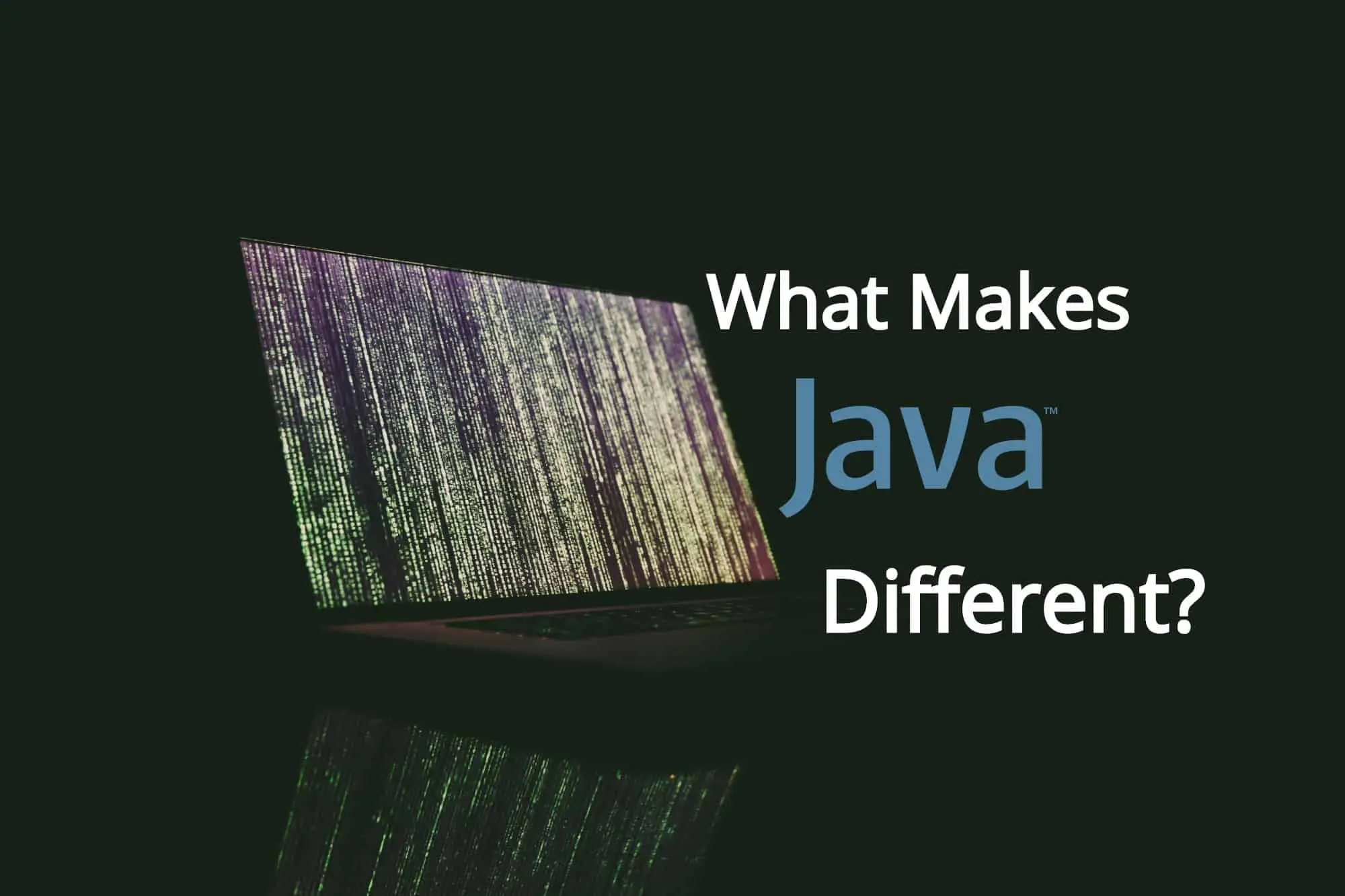I’m sitting here in my intro Java class and I can’t help but wonder; how is Java different from other languages? I did some research and found out what makes Java unique from other languages. I also included a side-by-side comparison of other popular programming languages so you can really see how Java is different.
Additionally, we should consider that Java is one of the oldest languages still in use today. Therefore, since there are other, newer, simpler languages, I wanted to know if it’s still worth it to learn Java today, as opposed to one of the others.
How Is Java Different From Other Languages?
The main difference between Java and any other programming language is the unique method by which Java code is executed. Unlike compiled languages such as C++, Java is compiled into bytecode which can run on any device with the Java Virtual Machine (JVM). C++, on the other hand, is compiled directly into machine code and therefore, can only run on the same platform in which it was compiled.
Another unique feature is the enormous Java Class Library (JCL). That said, to answer this question thoroughly, Java must be compared to each language specifically. In the next section, Java is compared to six of the other major programming languages that are widely used today. This includes C, C#, C++, Javascript, Ruby, and Python.
Before diving into that, though, I’d like to look at how another Java Developer, Mohan Pawar, answered this question. I encourage you to read his full response, as there’s a lot more to it, but this is how he begins:
Java is a high level, robust, secured and object-oriented programming language. There are many key differences while comparing java with other languages. Code in C, C++ is first translated into specific type of native machine. The Java compiler instead turns code into something called Bytecode, which is then interpreted by software called the Java Runtime Environment (JRE) or JVM. With this we get the advantage of Write Once, Run Anywhere (WORA).
Java Side-By-Side Comparison With Other Languages
Java vs C (Very Different)
- Java is platform-independent. C is platform-dependent.
- Java is an object-oriented programming (OOP) language. C is procedural.
- Java follows the bottom-up approach. C follows the top-down approach.
- Java has automatic memory management. C has manual memory management.
- C uses pointers. Java does not.
- Java has built-in thread support. C does not.
Java vs C# (Very Similar)
- Java and C# are both OOP languages.
- Java is platform-independent. C# is platform-dependent.
- Java is used for developing web applications and games.
- C# is used for game and mobile development.
Java vs C++ (Some Similarities)
- Java is derived from C++.
- Java is compiled to bytecode (platform-independent). C++ is compiled to machine code.
- Java is object-oriented. C++ is both object-oriented and procedural.
- Java has automatic garbage collection. C++ does not.
- Java doesn’t support operator overloading. C++ does.
- Java doesn’t support structures and unions. C++ does.
- Java is slower than C++ in execution.
- Java is easier to use and simpler than C++.
- Java has a powerful cross-platform library. C++ libraries are robust but simple.
Java vs Javascript (Very Different)
- Java is a programming language. Javascript is a scripting language.
- Java and Javascript are both object-oriented programming (OOP) languages.
- Java runs on the Java Virtual Machine (JVM). Javascript runs on web browsers.
- Java is compiled and interpreted. Javascript is interpreted.
- Java requires more memory than Javascript.
Java vs Python (Some Similarities)
- Java and Python are both object-oriented programming (OOP) languages.
- Java is essentially a compiled language. Python is an interpreted language.
- Java and Python are both general-purpose programming languages.
- Java is harder to use than Python.
- Java requires more lines of code than Python for an equivalent program.
- Java and Python are both among the most popular programming languages, even today.
- Java is faster than Python in execution.
Java vs Ruby (Very Similar)
- Java and Ruby are both object-oriented programming (OOP) languages.
- Java and Ruby are both general-purpose programming languages.
- Java is a static programming language. Ruby is dynamic.
- Java and Ruby are both platform-independent.
- Java and Ruby both provide inheritance.
- Java requires more lines of code than Ruby for an equivalent program.
- Java is faster than Ruby.
- Java and Ruby can be used together and supplement each other.
How Has Java Influenced Other Languages?
Just in case you didn’t know how great Java is, here’s a little background. Java was invented in 1991 and was originally named Oak, a symbol of strength. However, it was changed to Java in 1995 due to trademark reasons. But this doesn’t really matter. What matters is the impact that Java had on the programming world.
When Java turned 20, Elliot Rusty Harold, author of two Java textbooks, wrote a celebratory birthday article for Java, just as I’m doing. It’s titled: Java at 20: How it changed programming forever and I highly recommend you give it a read. Here are a few things I gathered from reading it.
Before Java, the idea that you could write a program, compile it, and have it run on any computer was unheard of. But Java changed the game. This is what set Java apart from its predecessor, C++. Since then, yes, other platform-independent languages have sprouted up as a result of Java’s influence. That said, Java still reigns supreme, or at least as a top contender in the programming language arena, and will for some time yet.
Since its ‘creation’ in 1995, Java has had many improvements. In addition to being platform-independent, Java also has an automatic garbage-collection feature, strong static type-checking at compile-time, primitive types and control structures and so much more. Java is a general-purpose language that outperforms most other languages.
Should You Still Learn Java In 2020 And Beyond?
You absolutely should still learn Java. It may be over twenty years old, however, it’s updated all the time. Java is still among the most feature-rich, popular, and widely-used languages in the world. So yes, you should absolutely still learn Java. To learn about why it’s the most popular language in the world, check out my article here.
But you should also learn other languages, too. Java is an extremely powerful language, but if you also know Ruby, you can write the same program with both languages and it would be more optimized. Regardless, Java is a powerhouse and is insanely capable on its own.
Java may not be as simple as some other languages but it’s simple enough and popular enough that many Universities still teach it as an introductory programming language. It’s also used by many major companies including eBay, Uber, and Airbnb in the applications that run their business.
Java can be used to develop Android applications and is also used heavily in the Internet of Things (IoT) space. It’s used largely in cloud computing and even more so in enterprise applications. There has never been a better time to learn Java than today. If you want a list and tutorials of 10 free Java projects for beginners, check out my article What Can I Create With Java?
Related Articles

